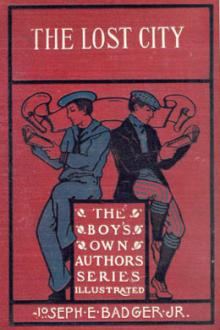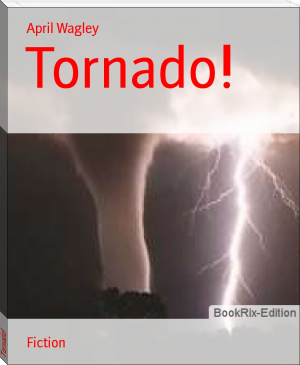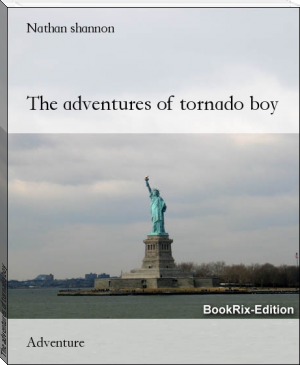The Lost City - Jr. Joseph E. Badger (children's books read aloud txt) 📗

- Author: Jr. Joseph E. Badger
- Performer: -
Book online «The Lost City - Jr. Joseph E. Badger (children's books read aloud txt) 📗». Author Jr. Joseph E. Badger
and of mind now came back to the air-voyagers, and after a little
they could lift their heads to peer around them with growing
wonder and curiosity.
There was little room left for doubting the wondrous truth, and
yet belief was past their powers during those first few minutes.
All around them whirled and sped those maddened winds, curling
and twisting, rising and falling, mixing in and out as though
some unknown power might be weaving the web of destiny.
Now dull, now brilliant, never twice the same, but ever changing
in colour as in shape, while stripes and zigzags of lightning
played here and there with terrifying menace, those walls of wind
held an awfully fascinating power for uncle and nephews.
From every side came deadened sounds which could bear but a
single interpretation: the tornado was still in rapid motion,
was still tearing and rending, crushing and battering, leaving
dire destruction and ruin to mark its advance, and these were the
sounds that recorded its ugly work.
In goodly measure revived by the compressed air, which was
regulated in flow to suit his requirements by a device of his
own, Professor Featherwit now looked around with something of his
wonted animation, heedless of his own peril for the moment, so
great was his interest in this marvellous happening.
So utterly incredible was it all that, during those first few
minutes of rallying powers, he dared not express the belief which
was shaping itself, gazing around in quest of still further
confirmation.
He took note of the windy walls about their vessel, rising upward
for many yards, irregular in shape and curvature here and there,
but retaining the general semblance of a tube with flaring top.
He peered over the edge of the basket, to draw back dizzily as he
saw naught but yeasty, boiling, seething clouds below,—a
veritable air-cushion which had served to save the pet of his
brain from utter destruction at the time of falling within—
Yes, there was no longer room for doubt,—they were actually
inside the distorted balloon, so dreaded by all residents of the
tornado belt!
“What is it, uncle?” huskily asked Bruno, likewise rallying under
that beneficial influence. “Where are we now?”
“Where I’m wishing mighty hard we wasn’t, anyhow!” contributed
Waldo, with something of his usual energy, although, judging from
his face and eyes, the youngster had suffered more severely than
either of his comrades in peril.
Professor Featherwit broke into a queerly sounding laugh, as he
waved his free hand in exultation before speaking:
“Where no living being ever was before us, my lads,—riding the
tornado like a—ugh!”
The air-ship gave an awkward lurch just then, and down went the
little professor to thump his head heavily against one corner of
the locker. Swaying drunkenly from side to side, then tossing up
and down, turning in unison with those fiercely whirling clouds,
the aeromotor seemed at the point of wreck and ruin.
Desperately the trio clung to the life-lines, clenching teeth
upon the life-giving tubes as that terrible pressure increased so
much that it seemed impossible for the human frame to longer
resist.
Fortunately that ordeal did not long endure, and again relief
came to those so sorely oppressed. A brief gasping, sighing,
stretching as the aerostat resumed its level position, merely
rocking easily within that partial vacuum, and then Waldo huskily
suggested:
“Looks like the blame thing was sick at the stomach!”
No doubt this was meant for a feeble attempt at joking, but
Professor Featherwit took it for earnest, and made quick reply:
“That is precisely the case, my dear lad, and I am greatly joyed
to find that you are not so badly frightened but that you can
assist me in taking notes of this wondrous happening. To think
that we are the ones selected for—”
“I say, uncle Phaeton.”
“Well, my lad?”
“If this thing is really sick at the stomach, when will it erupt?
I’d give a dollar and a half to just get out o’ this, science or
no science, notes or no notes at all!”
“Patience, my dear boy,” gravely spoke the little man of science,
busily studying those eddying currents like one seeking a fairly
safe method of extrication from peril. “It may come far sooner
than you think, and with results more disastrous than feeble
words can tell. We surely are a burden such as a tornado must be
wholly unaccustomed to, and I really believe these alternations
are spasmodic efforts of the cloud itself to vomit us forth;
hence you were nearer right than you thought in making use of
that expression.”
Just then came a rush of icy air, and Bruno pantingly cried:
“I’m swelling up—like Aesop’s—bullfrog!”
CHAPTER IV.
THE PROFESSOR’S LITTLE EXPERIMENT.
Again those involuntary riders of the tornado were tossed
violently to and fro in their seemingly frail ship, while the
balloon itself appeared threatened with instant dissolution,
those eddying currents growing broken and far less regular in
action, while the fierce tumult grew in sound and volume a
thousandfold.
All around the air-ship now showed ugly debris, limbs and boughs
and even whole trunks of giant trees being whirled upward and
outward, each moment menacing the vessel with total destruction,
yet as frequently vanishing without infringing seriously upon
their curious prison.
Sand and dirt and fragments of shattered rock whistled by in an
apparently unending shower, only with reversed motion, flying
upward in place of shooting downward to earth itself.
Speech was utterly impossible under the circumstances, and the
fate-tossed voyagers could only cling fast to the hand-rail, and
hold those precious air-tubes in readiness for the worst.
Never before had either of the trio heard such a deafening crash
and uproar, and little wonder if they thought this surely must
herald the crack of doom!
The tornado seemed to reel backward, as though repulsed by an
immovable obstacle, and then, while the din was a bit less
deafening, Professor Featherwit contrived to make himself heard,
through screaming at the top of his voice:
“The mountain range, I fancy! It’s a battle to the—”
That sentence was perforce left incomplete, since the storm-demon
gave another mad plunge to renew the battle, bringing on a
repetition of that drunken swaying so upsetting to both mind and
body.
A few seconds thus, then the tornado conquered, or else rose
higher in partial defeat, for their progress was resumed, and
comparative quiet reigned again.
The higher clouds curved backward, affording a wider view of the
heavens far above, and, as all eyes turned instinctively in that
direction, Bruno involuntarily exclaimed:
“Still daylight! I thought—how long has this lasted?”
“It’s the middle o’ next week; no less!” positively affirmed his
brother. “Don’t tell me! We’ve been in here a solid month, by
my watch!”
Instead of making reply such as might have been expected from one
of his mathematical exactness, Professor Featherwit gave a cry of
dismay, while hurriedly moving to and fro in their contracted
quarters, for the time being forgetful of all other than this,
his great loss.
“What is it, uncle Phaeton?” asked Bruno, rising to his knees in
natural anxiety. “Surely nothing worse than has already happened
to us?”
“Worse? What could be worse than losing for ever—the camera,
boys; where is the camera, I ask you?”
Certainly not where the professor was looking, and even as he
roared forth that query, his heart told him the sad truth; past
doubting, the instrument upon whose aid he relied to place upon
record these marvellous facts, so that all mankind might see and
have full faith, was lost,—thrown from the aerostat, to meet
with certain destruction, when the vessel first came within the
tornado’s terrible clutch.
“Gone,—lost,—and now who will believe that we ever—oh, this is
enough to crush one’s very soul!” mourned the professor, throwing
up his hands, and sinking back to the floor of the flying-machine
in a limp and disheartened heap for the time being.
Neither Bruno nor Waldo could fully appreciate that grief, since
thoughts and care for self were still the ruling passion with
both; but once more they were called upon to do battle with the
swaying of the winds, and once again were they saved only through
that life-giving cylinder of compressed air.
Presently, the heart-broken professor rallied, as was his nature,
and, with a visible effort putting his great loss behind him,
endeavoured to cheer up his comrades in peril.
“So far we have passed through all danger without receiving
material injury,—to ourselves, I mean,—and surely it is not too
much to hope for eventual escape?” he said, earnestly, pressing
the hands of his nephews, by way of additional encouragement.
“Yes,” hesitated Bruno, with an involuntary shiver, as he glanced
around them upon those furiously boiling clouds, then cast an eye
upward, towards yonder clear sky. “Yes, but—in what manner?”
“What’ll we do when the cyclone goes bu’st?” cut in Waldo, with
disagreeable bluntness. “It can’t go on for ever, and when it
splits up,—where will we be then?”
“I wish it lay within my power to give you full assurance on all
points, my dear boys,” the professor made reply. “I only wish I
could ensure your perfect safety by giving my own poor remnant of
life—”
“No, no, uncle Phaeton!” cried the brothers, in a single breath.
“How cheerfully, if I only might!” insisted the professor, his
homely face wearing an expression of blended regret and unbounded
affection. “But for me you would never have encountered these
perils, nor ever—”
Again he was interrupted by the brothers, and forced to leave
that regret unspoken to the end.
“Only for you, uncle Phaeton, what would have become of us when
we were left without parents, home, fortune? Only for you,
taking us in and treating us as though of your own flesh and
blood—”
“As you are, my good lads! Let it pass, then, but I must say
that I do wish—well, well, let it pass, then!”
A brief silence, which was spent in gripping hands and with eyes
giving pledges of love and undying confidence; then Professor
Featherwit spoke again, in an entirely different vein.
“If nothing else, we have exploded one fallacy which has never
met with contradiction, so far as my poor knowledge goes.”
“And that is—what, uncle Phaeton?”
“Observe, my lads,” with a wave of his hand towards those
whirling walls, and then making a downward motion. “You see that
we are floating in a partial vacuum, yet where there is air
sufficient to preserve life under difficulties. And by looking
downward—careful that you don’t fall overboard through
dizziness, though!”
“Looks as though we were floating just above a bed of ugly wind!”
declared Waldo, after taking a look below.
“Precisely; the aerostat rests upon an air-cushion amply solid
enough to sustain far more than our combined weight. But what is
the generally accepted view, my dear boys?”
“You tell, for we don’t know how,” frankly acknowledged Waldo.
“Thanks. Yet you are now far wiser than all of the scientists
who have written and published whole libraries concerning these
storm formations, but whose fallacies we are now fully prepared
to explode, once for all, through knowledge won by personal
investigation—ahem!”
Strange though it may appear, the professor forgot the mutual
danger by which they were surrounded, and trotted off on his
hobby-horse in blissful pride, paying no attention to the hideous
uproar going on, only raising his voice higher to make it heard
by his youthful auditors.
“The common belief is that, while these tornadoes





Comments (0)